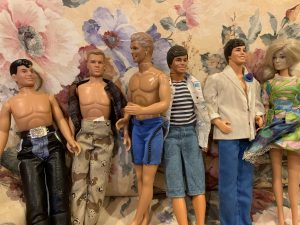I had a bunch of links for the monthly roundup, but nothing seems as important as babies dying in incubators at bombed hospitals in Gaza. So I’m going to add my two shekels to a topic that is provoking volleys of cancellations and counter-cancellations in our current discourse. I used to commend my Jewish heritage of Talmudic polyphonic debate as a superior alternative to Christians’ winner-take-all orthodoxy wars. It seems like those days are over, for the time being.
I am culturally and ethnically Jewish, though my current spiritual path is witchcraft. I had a serious Jewish phase in my 20s when I kept a moderate form of kosher (no bacon cheeseburgers) and attended a spectrum of synagogues from Modern Orthodox to Reform. (Full disclosure, the Orthodox stint was entirely about meeting single guys under 40.) Ever since my Episcopal years have come to a close, I’ve circled back to appreciating the ways that Jewish folklore and values shaped my upbringing. I was brought up to believe in education, truth-telling, and fighting for the underdog. I didn’t take it for granted that the American empire fully included me.
Secularized, assimilated Jews of my generation, and possibly my parents’ generation too, coalesced around Zionism as a substitute for the ritual observances that used to define Jewish identity. I didn’t know anything about what Palestinians’ lives were actually like. I didn’t think about the legalized segregation and discrimination that are required to maintain any country as being “for” one group of people. Israel’s “right to exist,” and its right to enforce a two-tier system of civil rights, were–and still are–conflated.
Following the horrifying attacks and hostage-taking by Hamas on October 7, everything that liberal and moderate Jews have criticized about Netanyahu’s repressive right-wing government has gone out the window. Now it’s taboo to talk about why some Palestinians were desperate enough to commit war crimes. Or, on the lefty side of the debate, it becomes even more difficult to hold space for the simultaneous observations that Jews are beneficiaries of apartheid in Israel and an oppressed minority elsewhere in the world. Anti-semitic violence in America is real–though it is largely perpetrated by right-wing Christian white supremacists, not Arabs or Muslims.
Sure, some kind of military response to a terrorist attack makes sense, but it defies credibility that the world-class Israeli intelligence service has no better way to “find” Hamas leaders than by flattening the entire Gaza Strip. One has to be deliberately obtuse to deny that Israel is taking advantage of the situation to force Palestinians en masse out of Gaza, and even the West Bank, which is not connected to the Hamas attack.
I haven’t signed any of the pro-Palestinian open letters circulating in the literary community because they didn’t seem nuanced enough for me. I have no gripe with the people who did sign them. It’s clear to me that they’re motivated by compassion for the Palestinian victims of Israel’s indiscriminate bombing, not by Jew-hatred. (More about this in a moment.)
A document I would feel comfortable endorsing is this eloquent letter by students at Brown University. “An open letter from Jewish students” was signed by “a collective of anti-occupation Jews” and published in the Brown Daily Herald on Nov. 7.
Zionist institutions purport to be representative of all Jews, often using us as a rhetorical shield to support the unconscionable actions of the state of Israel… We stand in solidarity with Brown Students for Justice in Palestine and the Palestine Solidarity Caucus in the pursuit of the liberation of Palestinian peoples. We know intimately that Jewish struggles are necessarily bound up in global struggles for freedom.
…Every single author of this piece has lost ancestors to state-sanctioned anti-Jewish violence. We have all grown up grappling with the intergenerational ripples of such atrocities. There is no question that antisemitism exists.
But we do not accept a Jewish ethnostate as the solution to our struggle. By using the Shoah and our collective traumas to justify the ethnic cleansing of Palestinians, the Israeli military project insults the memory of our ancestors. We will not allow history to repeat itself; “never again” calls for the protection of everyone — Jews and non-Jews alike — from genocide.
If we cannot acknowledge and reject Israel’s indiscriminate killing of thousands and forced displacement of over 1.5 million Palestinians, then we have failed to learn from our history.
We want to illustrate a distinction that many Zionists attempt to obfuscate: First, there is the spiritual entity of Israel — as Jacob’s alias, as the Jewish people, as a word that features in many of our prayers. Then, there is the state of Israel, which was founded in 1948. Even the nomenclature of the state of “Israel” serves to confuse political Zionism with Judaism and Jewishness. This conflation is dangerous and ignores a long and ongoing history of Jewish opposition to Zionist nation-state ideology. We hold our opposition to the state simultaneously with our connection to the amorphous spiritual entity.
One impetus for this letter was an Oct. 25 missive from the Anti-Defamation League and Brandeis Center to some 200 American universities, urging them to “investigate the activities of your campus chapter of Students for Justice in Palestine…for potential violations of the prohibition against materially supporting a foreign terrorist organization” (i.e., Hamas).
Seriously…the leftist Jews who were blacklisted by McCarthy are turning in their graves!
Meanwhile, another casualty of the schism in American Judaism may be the venerable Unterberg Poetry Center at the 92nd Street Y in New York City. Jewish Currents reports that the Poetry Center’s programming is on hold since it tried to impose a Zionist litmus test on the writers who spoke there:
That legacy now appears to be in jeopardy following the Y’s abrupt postponement of a planned October 20th Poetry Center talk by the professor and novelist Viet Thanh Nguyen, who had signed an open letter in the London Review of Books two days earlier calling for an end to “the unprecedented and indiscriminate violence that is still escalating against the 2.3 million Palestinians in Gaza.” The Y, which released a statement pledging support for Israel the day after Hamas’s attacks on Israeli civilians on October 7th, has long been an officially Zionist organization—sometimes to the frustration of employees who disagree with this stance—but has generally left subsidiaries like the Poetry Center alone to book whatever speakers they choose. However, in a comment to The New York Times, the Y acknowledged that the decision had been made due to Nguyen’s “public comments on Israel.”
The postponement soon led to a cascade of Poetry Center event cancellations and staff resignations. On October 21st, the writers Dionne Brand, Saidiya Hartman, and Christina Sharpe announced on X (formally known as Twitter) that as “anti-racist, anti-imperialist, and anti-colonial thinkers,” they had pulled out of their upcoming talk; the critic Andrea Long Chu, poet Paisley Rekdal, and writers Chris Kraus and Hannah Gold also canceled their respective events. The next day, Chihaya and senior program coordinator Sophie Herron—two of the Poetry Center’s three employees—resigned from their positions. By October 23rd, the Y confirmed to the Times that the Poetry Center had postponed its reading series. The future of the literary institution is now uncertain.
…In late October, the Y added a new policy to its website stating that it will continue “welcoming people who are critical of Israel, as long as they have not and do not actively call for the destruction of the State of Israel or question its legitimacy,” a move that could exclude a broad swath of potential speakers, both Jewish and not, who identify as anti-Zionist or support a political vision for future coexistence in the region that does not include Jewish statehood.
The article notes that similar conflicts are playing out within other American Jewish institutions, such as the campus ministry network Hillel International. The younger generation is no longer willing to abide by its elders’ taboos.
It’s encouraging, meanwhile, to read about the rabbis and Jewish leaders who are joining protests against Israel’s assault on civilian targets. This CNN story from Oct. 25 describes one such sit-in for a ceasefire on Capitol Hill. Jewish Voice for Peace and IfNotNow are leading the charge to redefine Jewish identity around supporting human rights for everyone in Israel.
“As Jewish people whose ancestors went through the Holocaust, when we hear Prime Minister Benjamin Netanyahu and Defense Minister Yoav Gallant use words like ‘the children of darkness’ and ‘human animals’ to describe Palestinians, we feel the resonances of that in our bones,” said IfNotNow political director Eva Borgwardt, referring to recent comments made by the Israeli officials.
“We know exactly where that language leads, and we are here to stop what they clearly intend to be a genocide. We will come to the doors of our lawmakers, we will be at the doors of our lawmakers for as long as it takes.”
Readers may recall that the U.S. House censured Rep. Rashida Tlaib (D-Mich) last week for using the phrase “From the river to the sea, Palestine will be free,” a Palestinian liberation slogan that critics interpret as calling for the eradication of Israel. Tlaib is the first Palestinian-American woman in Congress.
Following the vote to advance the censure resolution, Tlaib delivered an emotional speech on the House floor and argued that her criticism of the Israeli government should not be conflated with antisemitism.
“It is important to separate people and governments. No government is beyond criticism. The idea that criticizing the government of Israel is antisemitic sets a very dangerous precedent, and it’s been used to silence diverse voices speaking up for human rights across our nation,” she said.
She grew emotional and had trouble speaking after she said, “I can’t believe I have to say this, but Palestinian people are not disposable.”
…A censure resolution is one of the most severe forms of punishment in the House, which has historically been saved for the most egregious offenses such as a criminal conviction. A censure does not remove a member from the House and carries no explicit penalties beyond a public admonition.
I find this treatment of Rep. Tlaib to be pretty offensive and hypocritical considering how many election deniers and fake-news-spreaders there are in Congress. For background, I recommend this Jewish Currents article from 2021, “What Does ‘From the River to the Sea’ Really Mean?” Palestinian-American historian Yousef Munayyer explains:
“From the river to the sea” is a rejoinder to the fragmentation of Palestinian land and people by Israeli occupation and discrimination. Palestinians have been divided in a myriad of ways by Israeli policy. There are Palestinian refugees denied repatriation because of discriminatory Israeli laws. There are Palestinians denied equal rights living within Israel’s internationally recognized territory as second-class citizens. There are Palestinians living with no citizenship rights under Israeli military occupation in the West Bank. There are Palestinians in legal limbo in occupied Jerusalem and facing expulsion. There are Palestinians in Gaza living under an Israeli siege. All of them suffer from a range of policies in a singular system of discrimination and apartheid—a system that can only be challenged by their unified opposition. All of them have a right to live freely in the land from the river to the sea.
But it is precisely because Zionist settler colonialism has benefitted from and pursued Palestinian fragmentation that it seeks to mischaracterize and destroy inclusive and unifying rhetorical frameworks. For example, journalist Marc Lamont Hill was attacked and ultimately removed from his position at CNN for calling for Palestinian freedom “from the river to the sea.” After all, it is far easier to dominate a divided people fighting different battles on different fronts than it is to dominate one people united in a single battle for the same universal rights.
Since Zionists struggle to make a persuasive argument against freedom, justice, and equality for all people throughout the land, they seek instead to attack the message and messenger. When Palestinians proclaim “from the river to the sea, Palestine will be free,” many Zionists argue that this is a Palestinian call for genocide. But as historian Maha Nassar has noted, there has never been an “official Palestinian position calling for the forced removal of Jews from Palestine.”
What Munayyer is getting at, I believe, is the misconception that everything is fine and democratic in Israel outside the “occupied territories” of Gaza and the West Bank. This is what I and many American Jews were taught about Zionism. In this context, “from the river to the sea” means that the second-class citizenship of Palestinians exists everywhere and shouldn’t be acceptable anywhere.
Being a trauma survivor makes you paranoid. Because you’ve had so little power globally, you don’t recognize when you do have power locally, and therefore you don’t use it in a responsible way. My people need some collective therapy so we don’t keep punching down.













